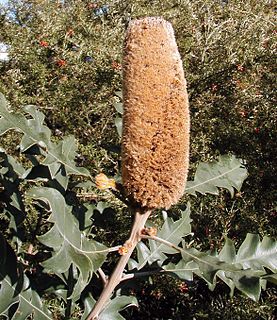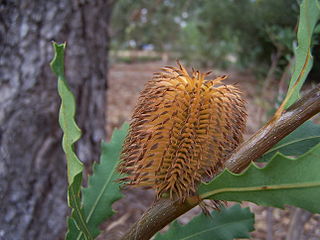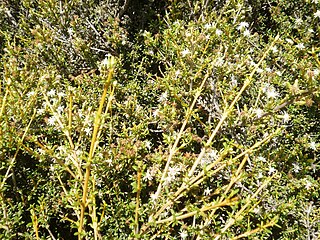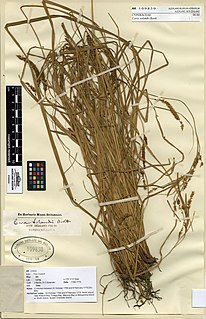Related Research Articles

The providence petrel is a species that nests in two locations in the Tasman Sea: Lord Howe Island and Philip Island.

Wahoo is a scombrid fish found worldwide in tropical and subtropical seas. It is best known to sports fishermen, as its speed and high-quality flesh makes it a prized and valued game fish. In Hawaii, the wahoo is known as ono. The species is sometimes called hoo in the USA.

Banksia subg. Banksia is a valid botanic name for a subgenus of Banksia. As an autonym, it necessarily contains the type species of Banksia, B. serrata. Within this constraint, however, there have been various circumscriptions.

Rexea solandri, the silver gemfish, is a species of snake mackerel found in the southwestern Pacific Ocean around Australia and New Zealand with reports of possible records from Madagascar and Japan. Gemfish appear as infrequent, but regular bycatch species in pelagic longline fisheries for tuna in the waters around the Hawaiian archipelago and American Samoa. This species occurs in schools at depths of between 100 to 800 metres though mostly between 300 to 450 metres. This species can reach a length of up to 110 centimetres (43 in) SL and a maximum weight of 16 kilograms (35 lb) has been recorded. This species is important to local commercial fisheries.

Banksia solandri, commonly known as Stirling Range banksia, is a species of large shrub in the plant genus Banksia. It occurs only within the Stirling Range in southwest Western Australia. Its scientific name honours the botanist Daniel Solander, one of the first collectors of Banksia.

Banksia ser. Quercinae is a valid botanic name for a series of Banksia. First published by Carl Meissner in 1856, the name has had three circumscriptions.

Banksia ser. Grandes is a taxonomic series in the genus Banksia. It consists of two closely related species in section Banksia, both endemic to Western Australia. These are B. grandis and B. solandri.
Carl Meissner's taxonomic arrangement of Banksia was published in 1856, as part of his chapter on the Proteaceae in A. P. de Candolle's Prodromus systematis naturalis regni vegetabilis. It was the first attempt to provide an infrageneric classification for the genus, aside from Robert Brown's publication of two subgenera in 1810. Meissner's arrangement stood until 1870, when it was superseded by the arrangement of George Bentham. Meissner's arrangement was an excellent survey of the known species at that time, but his infrageneric taxa were all highly heterogeneous.

Nothofagus solandrivar.solandri, commonly called black beech, is a variety of the tree species Nothofagus solandri, endemic to New Zealand. Black beech occurs on both the North and the South Island at low altitudes up to the mountains. The other variety of N. solandri is called mountain beech or Nothofagus solandri var. cliffortioides, and grows at higher altitudes than black beech. In New Zealand the taxon is called Fuscospora solandri.

Canthigaster solandri is a ray-finned species of fish and member of the pufferfish family. It grows to a length of 11.5 centimers (4.5 in). It lives in the tropical Indo-Pacific: from East Africa to the Line Islands and Tuamotu, north to the Ryukyu Islands, south to New Caledonia and Tonga, to the Hawaiian Islands. They have the ability to rapidly fill themselves up like a water balloon, to protect themselves from predators. Their skin also contains a poison.

Rhabdothamnus solandri, is the only member of the genus Rhabdothamnus, and the only plant from the family Gesneriaceae native to New Zealand. The common names for the plant are New Zealand gloxinia, and in Māori language: taurepo, matata and waiuatua.

Nothofagus solandri var. cliffortioides, commonly called mountain beech, is a species of Southern beech tree and is endemic to New Zealand. Mountain beech grows in mountainous regions at high altitudes. In New Zealand the taxon is called Fuscospora cliffortioides. Nothofagus solandri var. cliffortioides occupies a wider range of habitat than any other New Zealand tree species and it shows a corresponding range of life form, seeding habits, regenerative patterns, growth habits, growth rates, stand replacement and mortality patterns.

Olearia solandri, commonly known as coastal daisy-bush or coastal tree daisy, is a coastal shrub of New Zealand.

Carex solandri is a species of sedge that was first described by Francis Boott in 1853.

Rhytiphora is a genus of longhorn beetles of the subfamily Lamiinae, containing the following species:
Rhytiphora transversesulcata is a species of beetle in the family Cerambycidae. It was described by Stephan von Breuning in 1938. It is known from Australia.
Rhytiphora neglecta is a species of beetle in the family Cerambycidae. It was described by Francis Polkinghorne Pascoe in 1863, originally under the genus Symphyletes. It is known from Australia. It feeds on Acacia longifolia.
Rhytiphora cinnamomea is a species of beetle in the family Cerambycidae. It was described by Francis Polkinghorne Pascoe in 1859. It is known from Australia.
Rhytiphora albocincta is a species of beetle in the family Cerambycidae. It was described by Félix Édouard Guérin-Méneville in 1831, originally under the genus Saperda. It is known from Australia. It feeds on Acacia pubescens and Acacia longifolia. It contains the variety Rhytiphora albocincta var. compos.

Rhytiphora pulverulea is a species of beetle in the family Cerambycidae. It was described by Jean Baptiste Boisduval in 1835. It is known from Australia.
References
- ↑ BioLib.cz - Rhytiphora solandri. Retrieved 8 September 2014.